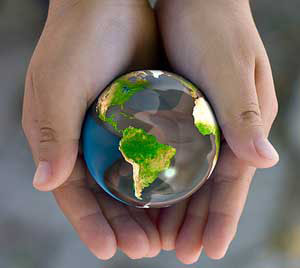It’s only the first day of the United Nations climate change summit in Copenhagen, but as I waited in the three-hour line to enter the Bella Center where the conference is taking place, my inbox was already filling up with a flurry of both good and bad news.
Let’s start with the good news. There was much celebration over the weekend after the White House announced that Barack Obama was planning to push back his arrival at the summit to the final day—when other world leaders would be present, and when his appearance has the best chance of affecting the negotiations. The White House said that the president expects a “meaningful” agreement and wants to arrive when his presence will be “most productive.” The Obama administration also acknowledged that developed nations should provide $10 billion a year by 2012 to help poorer countries adapt to climate change—a major concern for poor nations heading into the summit.
On Monday, the Obama administration is also expected to announce that it has finalized the finding that greenhouse gases pose a threat to human health. This is the final step before the Environmental Protection Agency can begin regulating emissions. The announcement is expected for Monday afternoon, timed to coincide with the start of the climate gathering. The announcement is “absolutely the right decision at absolutely the right time,” said Joe Mendelson, Global Warming Policy Director for the National Wildlife Federation in a statement.
Also on Monday, the UN Environment Program released a report conducted by British economist Lord Nicholas Stern and the Grantham Research Institute which found that pledges from both developed and developing countries are actually closer to the cuts that science deems necessary than previously assumed. In other words, the pledges on the table at Copenhagen still fall short, but bridging the gap between what’s on offer and what’s needed is now a somewhat more maneagable task.
There was also some good news from India, which announced climate targets over the weekend. The country won’t accept legally binding targets, but agreed to reduce greenhouse gas intensity between 20 and 25 percent by 2020. Prime Minister Manmohan Singh will also attend the summit—yet another high-level visitor for the conference’s final days.
And now, the bad news. The G77—the bloc of developing countries—is unhappy with what richer countries have promised so far. Rajendra Pachauri, chairman of the Intergovernmental Panel on Climate Change, says that the US could do more on climate via executive action, rather than waiting around for Congress to act.
There was also disappointment among NGOs at the summit as news broke that the U.S. Export-Import Bank is providing $3 billion in financing to Exxon Mobil Corp. for a natural gas project in Papua New Guinea, instead of funding cleaner forms of energy.
The next two weeks will be filled with similar positive signs and disappointments. There are a lot of issues to be grappled with, some big, some small. There will be moments when it seems like a breakthrough has occurred, and moments where negotiations will seem to be on the brink of absolute failure. It’s all part of the grueling process of hammering out a major, contentious international treaty in which every single player has a lot at stake.














